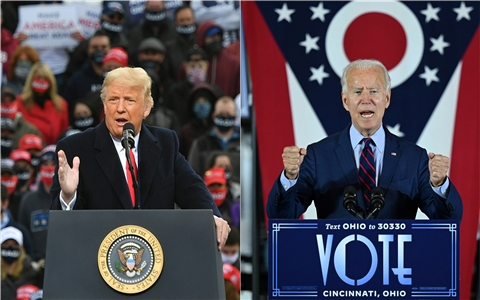
发布时间:2020-11-11
对中国采取强硬态度使两极分化的美国团结起来
导读:
美国时间11月7日下午,多家美国主流媒体报道,美国民主党总统候选人拜登已获得270张选举人票,赢得了2020年总统大选。这一消息,终于结束了特朗普和拜登最终谁会成为新一届美国总统的悬念。然而据美媒分析,无论是拜登当选还是特朗普当选,美国对中国采取的强硬态度都不会改变。本期我们转载一篇美国消费者新闻与商业频道(CNBC)2020年11月4日发表的时事评论文章。本文由雷梭勒从英文原文编译,版权归原作者所有。

原文标题:前贸易谈判代表说,对中国采取强硬态度使两极分化的美国团结起来
作者:萨赫利·罗伊·乔杜里
前白宫首席贸易谈判代表克莱特·威尔姆斯(Clete Willems)表示,对中国采取强硬态度,使目前两极分化的美国团结起来。无论谁入主白宫(截止发稿时,拜登已赢得了2020年总统大选),美国与中国的关系都将或多或少维持现状,艾金·岗波律师事务所合伙人威尔姆斯表示。“事情的真相是,对中国采取强硬态度,将使我们这个两极分化的国家团结起来。我们在政治上是两极化的,但在中国问题上不是两极化的。”威尔姆斯说,如果拜登获胜,他将受到政治环境的限制,不太可能回到他过去所持的一些被认为相对弱势的对华立场。不过,拜登的政策可能更具可预测性。

“你不会在半夜发推文宣布关税之类的事情,但总体轨迹将大致相同。我认为中国将不得不面对这一现实。”威尔姆斯说。由于贸易战、美国对中国公司的制裁以及美国对台湾和印度的支持增加,世界上最大的两个国家的双边关系,在过去几年里显著恶化。特朗普和他的政府谴责中国的不公平贸易行为,盗窃知识产权,以及最近的冠状病毒大流行。 威尔姆斯指出,两国之间的“第一阶段”贸易协议,解决了美国对中国做法的一些担忧。为了遏制长达18个月的贸易战,两国今年签署了一项贸易协定,推动中国加强其知识产权保护计划,并在两年内增加对美国制造业、能源、农产品和服务的采购。“如果你看看农业市场准入,以及知识产权的变化,那是一些真正有意义的东西,我认为那将是一份持久的遗产。”威尔姆斯说。他还说,对中国科技巨头华为实施的出口管制,令该公司陷入了生存困境。美国政府认为华为存在国家安全风险。

“显然,我们已经取得了一些成功。我认为在很多方面,还有很长的路要走。”他补充说,如果拜登获胜,他希望这位前副总统可以从特朗普手里“接过火炬”,并处理好一些涉及中国且尚未得到解决的重大问题。当被问及拜登政府领导下的美国,是否有可能重新加入大规模的跨太平洋伙伴关系贸易协定时,威尔姆斯指出该协定在国会面临两党反对。据威尔姆斯说,虽然拜登可能会再次考虑该协议,但在美国考虑重新加入该协议之前,需要对其中一些条款进行重新谈判。
Original English Text
Being tough on China is what unifies a polarized U.S., former trade negotiator says
Saheli Roy Choudhury, Published Wed, Nov 4 2020 11:27 PM EST
Being tough on China is what unifies a polarized United States right now, according to former top White House trade negotiator Clete Willems. A day after Americans voted, the race between President Donald Trump and Democratic nominee Joe Biden is still up in the air — with six states yet to be called by NBC News.
Regardless of who takes the White House, the relationship with China will remain more or less status quo, said Willems, a partner at Akin Gump.
“The truth of the matter is that being tough on China is what unifies us in a polarized nation right now. We’re polarized in our politics but we are not polarized on China,” he told CNBC’s “Squawk Box Asia” on Thursday.
Willems said that if Biden wins, he would be constrained by the political environment and will unlikely go back to some of the China positions he held in the past that were seen as relatively weak. Still, there would likely be more predictability in Biden’s policies. “You’re not going to have tweets announcing tariffs in the middle of the night kind of thing, but overall the trajectory is going to be more or less the same. I think China is going to have to deal with that reality moving forward,” Willems said.
Bilateral relations between the world’s two largest countries have deteriorated significantly over the last few years due to a trade war, U.S. sanctions against Chinese companies, and increased American support for Taiwan as well as India. Trump and his administration have blamed China for its unfair trade practices, intellectual property theft, and more recently, the coronavirus pandemic.
Willems pointed out that the “phase one” trade deal between the two countries addressed some of the concerns the U.S. has over China’s practices. To rein in an 18-month trade war, both countries signed a trade agreement this year that pushed China to strengthen its intellectual property protection plan and increase its purchase of American manufacturing, energy and agricultural goods and services over two years.
“If you look at the agricultural market access, if you look for the IP changes, that was some real meaningful stuff and I think that will be a lasting legacy,” Willems said. He added that export controls imposed on Chinese tech giant Huawei, which was labeled a national security risk by Washington, sent the firm into survival mode.
“There’s clearly been some successes to point to. I do think that in a lot of respects, there’s a long way to go,” he said, adding that he hopes that if Biden wins, the former vice president can “pick up the torch” from Trump and deal with some of the major issues concerning China that have yet to be addressed.
When asked if there was a chance that the U.S., under a Biden administration, may rejoin the massive Trans-Pacific Partnership trade agreement, Willems pointed out the deal faced bipartisan opposition in Congress. While Biden may potentially look at the agreement again, there would need to be renegotiation of some of the provisions before the U.S. considers rejoining the pact, according to Willems.
Sooswiss为您提供
瑞士方向私人管家式的定制服务:
1)家族传承 2)财富管理 3)瑞士投资
4)居留计划 5)税务优化 6)家族治理
更多资讯请登录网站 www.sooswiss.com
